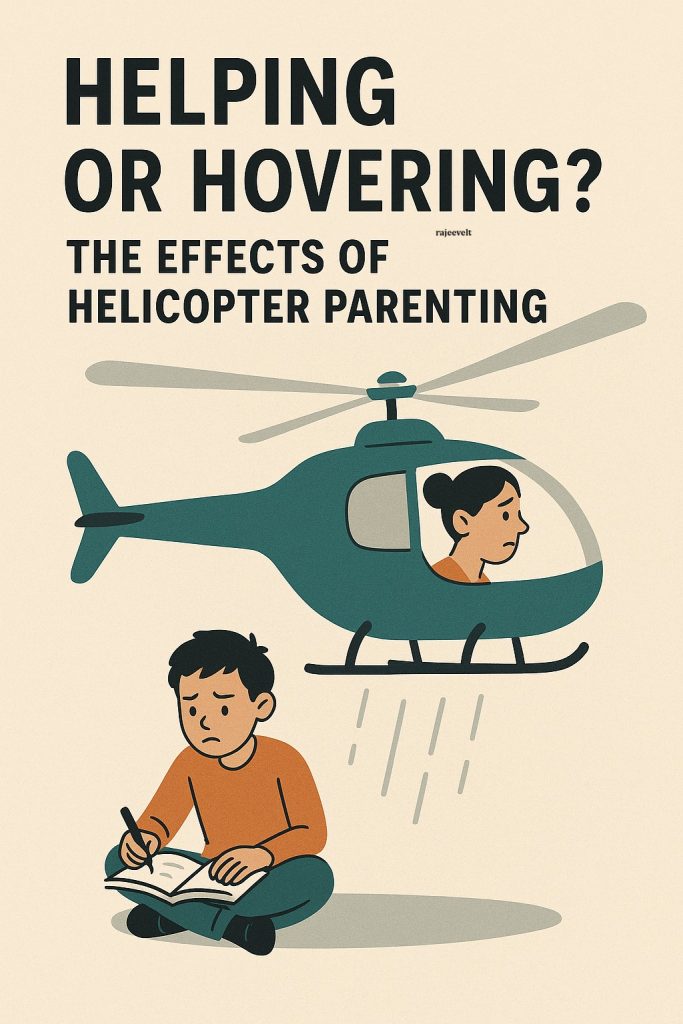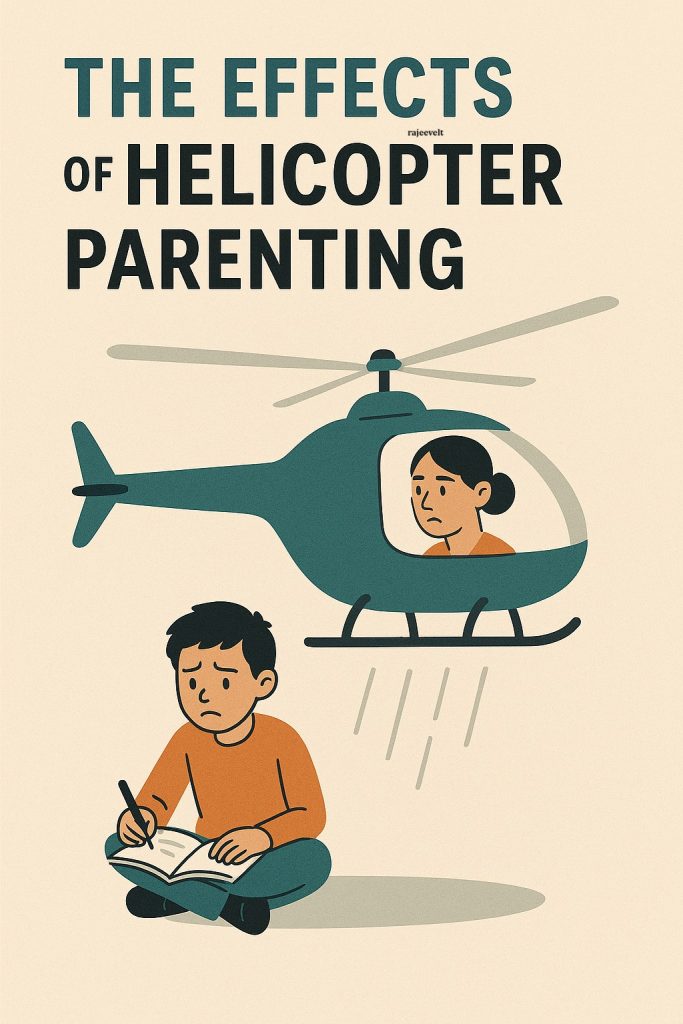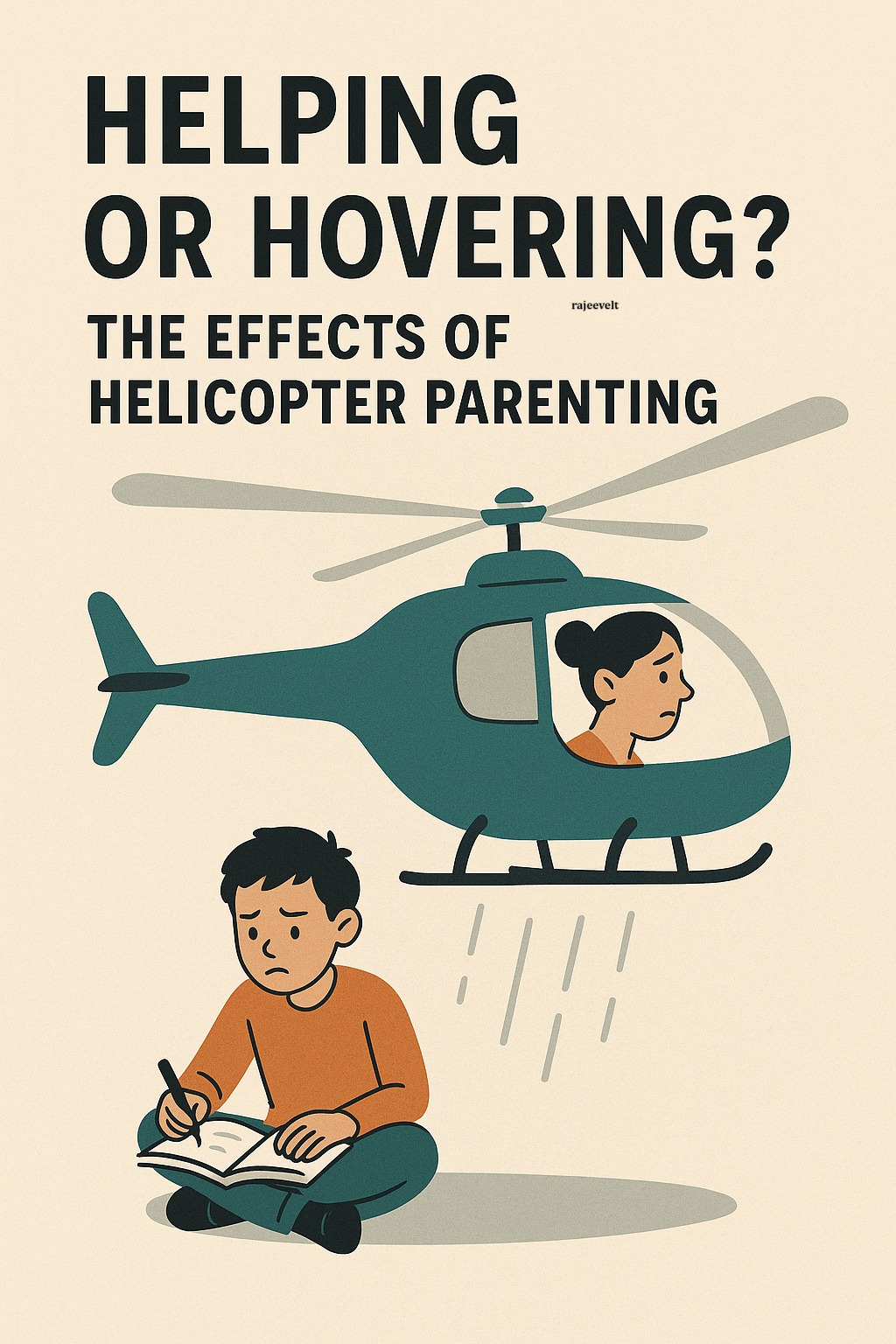Helicopter parenting, a term coined in the 1960s and popularized in the early 2000s, describes a style of parenting characterized by excessive involvement in a child’s life, often with the intent to protect or ensure success. These parents “hover” over their children, closely monitoring and intervening in their academic, social, and personal affairs. While the intentions behind helicopter parenting are often rooted in love and concern, research indicates that this approach can have significant consequences—both positive and negative—on a child’s development.
Understanding Helicopter Parenting
Helicopter parenting is defined as a high level of parental involvement that exceeds typical support, often involving overprotection, overcontrol, or micromanagement. This parenting style contrasts with authoritative (balanced), authoritarian (strict), or permissive (lenient) approaches. Helicopter parents may complete their child’s homework, make decisions for them, or intervene in conflicts with teachers or peers, believing they are safeguarding their child’s future. The term gained traction in the context of rising societal pressures, such as competitive academic environments and economic uncertainty.
A 2018 study by the American Psychological Association (APA) found that helicopter parenting is more prevalent in affluent families, where parents have the resources to closely monitor their children’s activities. However, it is not limited to any socioeconomic group and is observed globally, particularly in urban settings.

Effects of Helicopter Parenting
Positive Effects
While often criticized, helicopter parenting can yield some benefits, particularly in structured environments:
- Academic Support: Helicopter parents often ensure their children complete assignments and excel academically. A 2016 study in the Journal of Child and Family Studies found that children of highly involved parents may achieve higher grades in structured settings due to parental oversight.
- Safety and Security: Close monitoring can reduce exposure to risky behaviors, such as substance abuse or unsafe social situations, during adolescence.
- Resource Access: Helicopter parents often provide access to extracurricular activities, tutoring, and other opportunities, giving children a competitive edge.
Negative Effects
Despite these benefits, the drawbacks of helicopter parenting are well-documented and often outweigh the advantages:
Delayed Transition to Adulthood
Helicopter parenting can contribute to “emerging adulthood syndrome,” where young adults struggle to achieve milestones like financial independence or career stability. A 2022 report by the Pew Research Center noted that 32% of U.S. adults aged 18–34 still lived with their parents, with over-involvement cited as a contributing factor in some cases.
Reduced Independence and Problem-Solving Skills
Over-involvement can stifle a child’s ability to develop autonomy. A 2014 study published in Developmental Psychology found that college students with helicopter parents were less likely to make independent decisions, leading to lower self-efficacy and higher anxiety i.e. if a parent resolves a conflict with a teacher, the child may not learn how to negotiate or advocate for themselves.
Increased Anxiety and Stress
Constant parental oversight can create pressure to meet high expectations. A 2019 study in the Journal of Adolescence linked helicopter parenting to higher levels of anxiety and depression in young adults, as they internalize the belief that they cannot succeed without parental intervention.
Poor Coping Mechanisms
Children of helicopter parents may struggle to handle failure or setbacks. A 2020 study in Emerging Adulthood found that young adults with overinvolved parents were less resilient when facing challenges, such as job rejections or academic failures.
Strained Parent-Child Relationships
Overcontrol can lead to resentment or rebellion. Adolescents may feel suffocated, leading to conflicts or emotional distance. A case study from the Journal of Family Issues (2021) described a teenager who became secretive and disengaged from her parents after they excessively monitored her social media and friendships.
Case Studies and Real-Life Examples
Case Study 1: Ridhi ’s Academic Journey
Ridhi, a 17-year-old high school senior, had parents who meticulously planned her academic path. They chose her courses, hired tutors, and contacted teachers to negotiate grades. While Ridhi excelled academically, she struggled with anxiety and self-doubt. When she entered college, she found herself unprepared to manage her schedule or handle academic challenges independently. Her parents’ continued involvement—calling professors and arranging her dorm life—further hindered her ability to develop confidence. Ridhi’s case illustrates how helicopter parenting can undermine self-efficacy, even in high-achieving children.
Case Study 2: Chandan’s Social Struggles
Chandan, a 14-year-old, had parents who intervened in every peer conflict. When he argued with a friend, his mother contacted the friend’s parents to resolve the issue. While this initially protected Chandan from social rejection, it prevented him from learning conflict resolution skills. Chandan struggled to form meaningful relationships and relied heavily on his parents for social guidance. This case highlights the social consequences of over-involvement.
Real-Life Example: The College Admissions Scandal
The 2019 AIIMS. college admissions scandal, involving celebrities like Rahul and Ridhi , is a high-profile example of helicopter parenting taken to extremes. Parents paid bribes to secure their children’s admission to elite universities, bypassing merit-based processes. This not only deprived the children of authentic achievement but also exposed them to public scrutiny and legal consequences. The scandal underscores how overzealous parental involvement can backfire, harming both the child and the family.
Factors Driving Helicopter Parenting
Several societal and psychological factors contribute to the rise of helicopter parenting:
Media Influence: Portrayals of “perfect parenting” in media can create unrealistic expectations, pushing parents to hover excessively.
Cultural Pressures: In competitive societies, parents feel pressure to ensure their children succeed in academics, sports, or extracurriculars. The fear of “falling behind” drives over-involvement.
Economic Anxiety: With rising costs of education and housing, parents may feel compelled to micromanage their child’s path to secure a stable future.
Technology: Smartphones and monitoring apps allow parents to track their children’s locations, grades, and activities in real-time, enabling constant oversight.
Parental Anxiety: Some parents project their own fears or unfulfilled aspirations onto their children, leading to overcontrol.


Strategies for Holistic Child Development
The parents can adopt strategies that encourage independence, resilience, and emotional well-being to counteract the negative effects of helicopter parenting and promote well-balanced development. These strategies align with authoritative parenting, which balances support with autonomy.
1. Promote Independence Gradually
- Strategy: Allow children to make age-appropriate decisions, such as choosing extracurricular activities or managing homework. Start with small choices in early childhood (e.g., picking an outfit) and progress to larger ones (e.g., selecting college courses).
- Example: Instead of completing a child’s science project, guide them through the process, letting them troubleshoot problems independently.
- Benefit: Builds self-efficacy and problem-solving skills, as supported by a 2017 study in Parenting: Science and Practice.
2. Encourage Resilience Through Failure
- Strategy: Let children experience setbacks and learn from them. Avoid intervening immediately when they face challenges, such as a low grade or a peer conflict.
- Example: If a child fails a test, discuss what went wrong and help them create a study plan rather than contacting the teacher to dispute the grade.
- Benefit: A 2020 study in Psychological Reports found that children allowed to navigate failure develop stronger coping mechanisms.
3. Promote Emotional Intelligence
- Strategy: Teach children to identify and manage their emotions through open communication and empathy-building activities.
- Example: Use role-playing to practice resolving conflicts with peers or encourage journaling to process emotions.
- Benefit: Emotional intelligence is linked to better mental health and social skills, according to a 2018 study in Frontiers in Psychology.
4. Set Boundaries with Technology
- Strategy: Limit the use of monitoring apps and encourage open dialogue instead. Trust children to share their experiences while maintaining reasonable oversight.
- Example: Instead of tracking a teenager’s location constantly, agree on check-in times or discuss their plans openly.
- Benefit: Builds trust and reduces feelings of surveillance, promoting a healthier parent-child relationship.
5. Model Healthy Behavior
- Strategy: Demonstrate resilience, problem-solving, and self-care in your own life. Children learn by observing their parents’ actions.
- Example: Share stories of how you overcame a work challenge or managed stress, emphasizing adaptability.
- Benefit: Children are more likely to emulate positive behaviors, as noted in a 2019 study in Child Development.
6. Encourage Extracurricular Exploration
- Strategy: Support children in exploring diverse activities without dictating their choices. Allow them to try and quit activities to discover their interests.
- Example: Let a child experiment with sports, music, or art without pressuring them to excel or commit long-term.
- Benefit: Promotes self-discovery and reduces performance pressure, fostering intrinsic motivation.
7. Seek Professional Guidance When Needed
Benefit: Professional support can help parents find balance, as supported by research in Family Process (2021).
Strategy: If over-involvement stems from parental anxiety, consider consulting a family therapist or counselor to address underlying concerns.
Example: A parent struggling to “let go” might attend parenting workshops to learn authoritative techniques.
Balancing Involvement and Independence
The key to effective parenting lies in balancing involvement with autonomy. Authoritative parenting, which combines warmth, structure, and freedom, is widely regarded as the most effective approach for holistic development. A 2023 meta-analysis in Child Development Perspectives found that authoritative parenting correlates with higher academic achievement, better mental health, and stronger social skills compared to helicopter parenting. Parents can assess their approach by asking:
- Am I solving problems for my child or guiding them to find solutions?
- Do I allow my child to face consequences for their actions?
- Am I fostering skills that prepare my child for adulthood?
Helicopter parenting, while driven by good intentions, can hinder a child’s ability to develop independence, resilience, and emotional well-being. Through case studies like Ridhi and Rahul, and real-world examples like the college admissions scandal, we see the tangible consequences of over-involvement. However, the parents can support their children’s holistic development without hovering by adopting strategies like promoting independence, encouraging resilience, and modeling healthy behaviors. The goal is to raise self-reliant, confident individuals who are equipped to navigate life’s challenges—an outcome that benefits both the child and society as a whole.
References
Baumrind, D., et al. (2023). “Authoritative parenting revisited: A meta-analysis.” Child Development Perspectives, 17(1), 45–53.
American Psychological Association. (2018). “Parenting styles and child outcomes.” Journal of Child and Family Studies.
LeMoyne, T., & Buchanan, T. (2011). “Does hovering matter? Helicopter parenting and its effect on well-being.” Sociological Spectrum, 31(4), 399–418.
Schiffrin, H. H., et al. (2014). “Helping or hovering? The effects of helicopter parenting on college students’ well-being.” Developmental Psychology, 50(3), 941–949.
Segrin, C., et al. (2019). “The association between overparenting, parent-child communication, and mental health.” Journal of Adolescence, 75, 31–40.
Cui, M., et al. (2020). “Helicopter parenting and young adults’ adjustment.” Emerging Adulthood, 8(5), 389–398.
Pew Research Center. (2022). “Young adults living with parents: Trends and implications.”
Nelson, L. J., et al. (2021). “Parenting in the 21st century: Challenges and opportunities.” Journal of Family Issues, 42(6), 1234–1256.
Grolnick, W. S., & Pomerantz, E. M. (2017). “Facilitating autonomy in children.” Parenting: Science and Practice, 17(2), 101–120.
Brackett, M. A., et al. (2018). “Emotional intelligence and child development.” Frontiers in Psychology, 9, 1123.

Resources and References


